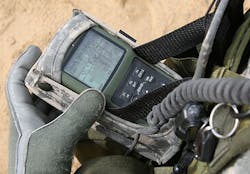Rockwell Collins pushes forward Air Force effort to rush M-Code GPS receivers to warfighters
Officials of the U.S. Air Force Space and Missile Systems Center at Los Angeles Air Force Base, Calif., announced a $36.6 million contract modification to Rockwell Collins Friday as part of the Military GPS User Equipment (MGUE) program.
The deal calls for Rockwell Collins to accelerate the MGUE program by providing enhance military GPS software code and deliver additional pre-prototype GPS receiver cards to support faster fielding of M-Code capable GPS receivers to the warfighter, Air Force officials say.
Rockwell Collins is a longtime supplier of rugged military GPS receivers for handheld use, for aircraft and vehicle use, as well as for GPS use in space. Friday's award brings the total value of Rockwell Collins's M-Code GPS contract to $109.3 million.
The company originally won a $30.9 million Air Force contract for MGUE research and development in September 2012. The company then won a $20 million modification in May 2014 for MGUE software coding and security; and a $21.7 million contract last January to provide additional pre-prototype receiver cards to enable faster fielding of M-Code GPS equipment.
Related: Ever-shrinking GPS electronics could bring satellite navigation to everyone
The joint-service MGUE program seeks to develop an updated set of military GPS receivers that provide accurate and reliable positioning, navigation, and timing service where current receiver performance might be compromised or unavailable.
The program seeks to address the increasing threat of enemy electronic warfare jamming of U.S. and allied GPS signals, as well as to deny the enemy the use of U.S. GPS signals. Orbiting GPS IIR-M and IIF satellites are part of the MGUE program, as are GPS III satellites that are in development.
Prototype GPS receiver electronic circuit cards built for the MGUE program are to help add new features into GPS receiver designs. The current maturity of the technology and lower risk levels than expected is enabling Air Force experts to accelerate fielding of several types of MGUE receivers to the U.S. Army, Air Force, Navy, and Marine Corps.
The MGUE also is developing Military Code (M-Code) signals, which are transmitted from modernized GPS satellites. These signals retain all legacy GPS receiver capabilities, yet offers high-power signals with the ability to resist jamming and interference.
M-Code signals also add security features to prevent their use by the enemy, and offer improved message formats and signal modulation for faster and more accurate performance.
Related: Air Force accelerates program to provide M-Code GPS receivers to warfighters worldwide
The Modernized User Equipment (MUE) program has produced prototype standard-sized military GPS receivers with M-Code and legacy C/A and P(Y) codes. The MGUE program, meanwhile, is developing production-ready GPS receivers for military use.
In addition to Rockwell Collins, Raytheon and L-3 IEC also are working on speeding M-Code GPS technology to warfighters through the MGUE program.
The Air Force is supervising development of a new, more compact Common GPS Module encompassing the modernized GPS digital application specific integrated circuit (ASIC) technology for use in applications where size, weight, and power (SWaP) need to be minimized.
The Common GPS Module is planned to be the GPS engine for future GPS receivers and other equipment or munitions that require positioning, navigation, and timing capability.
On this contract modification Rockwell Collins will do the work in Cedar Rapids, Iowa, and should be finished by February 2017. For more information contact Rockwell Collins online at www.rockwellcollins.com, or the Air Force Space and Missile Systems Center at www.losangeles.af.mil.
